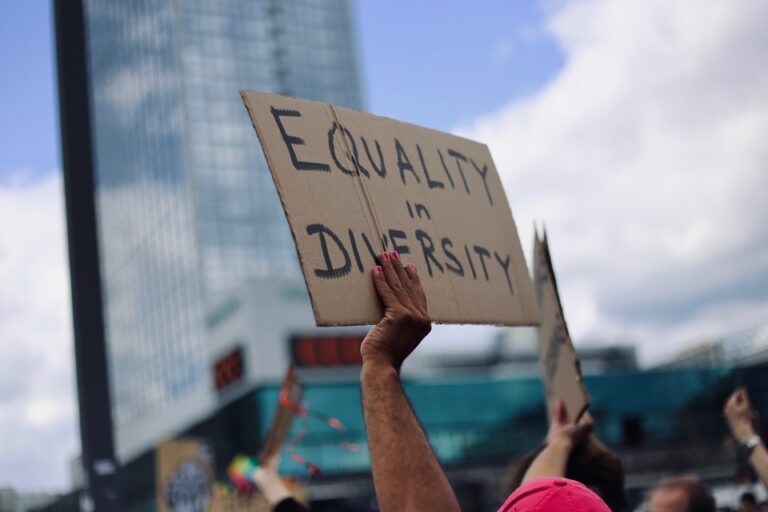
Alex Blutman is a student at Harvard Law School and a member of the Labor and Employment Lab.
May 25, last week, was the one-year anniversary of George Floyd’s murder. Professional athletes marked the occasion by advocating for the passage of the George Floyd Justice in Policing Act, building on the collective political action jumpstarted during last year’s NBA playoffs, which was highlighted by racial justice messaging and an unprecedented work stoppage. The NBA’s Social Justice Coalition, formed last year to address racial and social inequality and comprising NBA players, coaches, and team, league, and union executives, released a statement in support of the legislation. The National Basketball and Women’s National Basketball Players Associations teamed up with More than a Vote and Athletes for Impact, releasing a joint letter and creating an ad campaign to air throughout this year’s NBA playoffs. The NBPA has actively championed its “#CallYourSenators” cause in support of the George Floyd Act on social media, releasing a video of players’ reflections on using their platforms to encourage positive change, partnering with Support Black Colleges to create shirts and masks, and featuring photos of NBA and WNBA players and coaches sporting “Call Your Senators” apparel. The NFL Players Association also urged senators to pass the bill, and Black Players for Change, an independent organization representing Black players in Major League Soccer, joined the efforts of the NBPA.
During an interview for an NFL coaching job, former Patriots offensive tackle Eugene Chung, who is Korean, was told by a team official that he “was not the right minority.” The incident, which constitutes a possible Title VII violation, comes amidst the league’s larger and ongoing problem of failing to hire non-white candidates into head coach, assistant coach, and front office executive positions. Following the completion of the NFL’s 2020-2021 hiring cycle earlier this year, the league has a total of five head coaches of color among 32 teams—this is despite the NFL’s Rooney Rule, a diversity hiring initiative that was recently enhanced to require teams to interview at least two external minority candidates for head coaching jobs and one minority candidate for any of the top coordinator vacancies. The NFL indicated it is reviewing the incident involving Chung, and a league spokesman said that the “comment is completely inappropriate and contrary to league values and workplace policies.”
Following a civil rights lawsuit and agitation led by the families of former football players, the NFL announced its intention to discontinue the use of “race-norming” as a metric for the distribution of funds arising from the league’s $1 billion brain injury settlement. The settlement, reached in 2013, ended thousands of lawsuits accusing the NFL of obfuscating the link between concussions and traumatic brain injury. More than 2,000 NFL retirees have filed dementia claims, which, until this announcement, had been subject to “race-norming,” a type of statistical manipulation for neuropsychological testing that assumes Black players have a lower baseline cognitive functioning and which therefore made it harder for those players to show a cognitive deficit and qualify for an award.
15-year-old soccer phenom Olivia Moultrie won a temporary restraining order in her suit against the National Women’s Soccer League and its 18-year-old eligibility requirement, making her free to sign with one of the league’s teams. In addition to rejecting several antitrust defenses, the court also noted that the rule was not the product of collective bargaining between the league and Players Association and therefore could not be protected by the non-statutory labor exemption. The court was also unpersuaded by the league’s contention that the suit would upset ongoing labor negotiations with the Players Association, although U.S. District Judge Karin J. Immergut did note that should a forthcoming collective bargaining agreement include an age limit provision, the CBA would govern, and Moultrie would have to abide by that rule.










Daily News & Commentary
Start your day with our roundup of the latest labor developments. See all
February 19
Union membership increases slightly; Washington farmworker bill fails to make it out of committee; and unions in Argentina are on strike protesting President Milei’s labor reform bill.
February 18
A ruling against forced labor in CO prisons; business coalition lacks standing to challenge captive audience ban; labor unions to participate in rent strike in MN
February 17
San Francisco teachers’ strike ends; EEOC releases new guidance on telework; NFL must litigate discrimination and retaliation claims.
February 16
BLS releases jobs data; ILO hosts conference on child labor.
February 15
The Office of Personnel Management directs federal agencies to terminate their collective bargaining agreements, and Indian farmworkers engage in a one-day strike to protest a trade deal with the United States.
February 13
Sex workers in Nevada fight to become the nation’s first to unionize; industry groups push NLRB to establish a more business-friendly test for independent contractor status; and UFCW launches an anti-AI price setting in grocery store campaign.